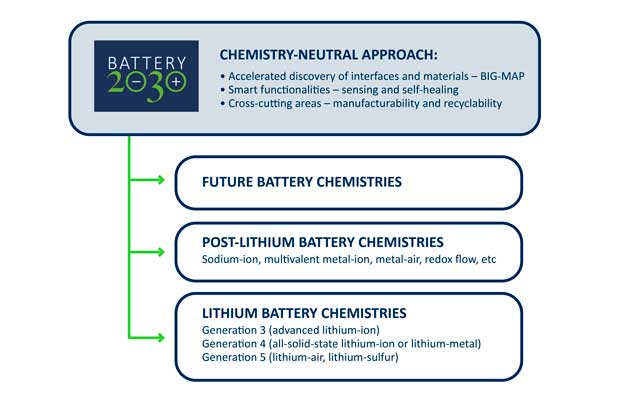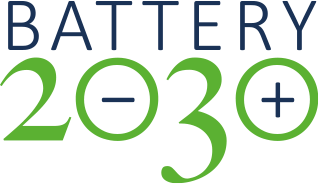CHEMISTRY-NEUTRAL APPROACH
BATTERY 2030+ brings together the most important stakeholders in the field of European battery R&D to invent the sustainable batteries of the future and to work on concrete actions that support the implementation of the European Green Deal, the UN Sustainable Development Goals, and, of course, the European Action Plan on Batteries and the SET -Plan.
BATTERY 2030+ is not about developing a specific battery chemistry, but about creating a generic toolbox for transforming the way we develop and design batteries. Thanks to this chemistry-neutral approach, BATTERY 2030+ will have an impact not only on current lithium-based battery chemistries, but also on post-lithium batteries, including redox flow batteries and on still unknown future battery chemistries. BATTERY 2030+ addresses key challenges such as achieving ultra-high battery performances, enhancing the lifetime and safety of battery cells and systems, and ensuring a circular economy approach for the sustainable batteries of the future.
To date, seven European Horizon 2020 projects are working together towards the vision and goals set out in the BATTERY 2030+ roadmap. Through a Europe-wide consultation process, the roadmap has identified long-term research directions focusing on the three main themes and six research areas. The current family of BATTERY 2030+ research projects is addressing four of these research areas.
I) Accelerated discovery of battery interfaces and materials
- Battery Interface Genome (BIG)
- Materials Acceleration Platform (MAP)
Research project – BIG-MAP coordinated by DTU
II) Integration of smart functionalities
- Sensing
- Self-healing
The research projects Sensing – INSTABAT, coordinated by CEA France; SENSIBAT, coordinated by IKERLAN Spain; SPARTACUS, coordinated by Fraunhofer Germany.
The research project Self-healing – HIDDEN, coordinated by VTT Finland; BAT4EVER, coordinated by VUB Belgium.
III) Cross-cutting areas
- Manufacturability
- Recyclability

